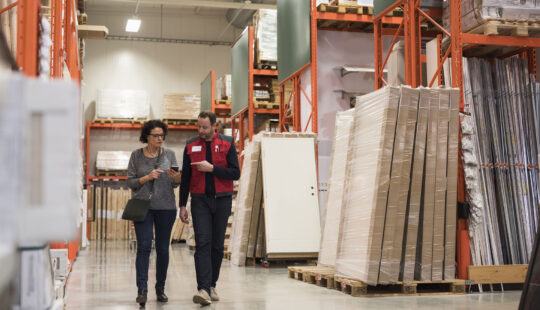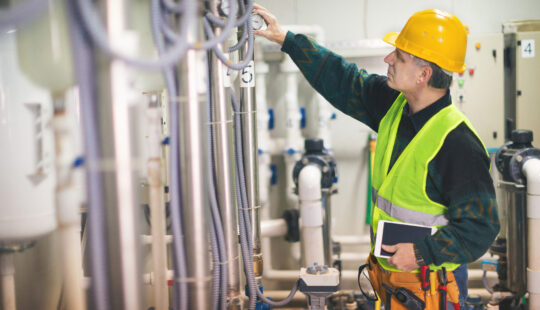It’s no surprise that ultra-chic bathroom brand VitrA markets itself as a bathroom and wellness business. After all, bathrooms were not just developed with hygiene in mind, but as a place to access water – considered the most purifying element for body and soul since ancient times.
“Today, bathrooms are where we go to rejuvenate ourselves. It’s also where our customers can make significant contributions to preserving water, our most vital natural resource,” said Alp Güldür, IT director and digital leader at Eczacibaşi Building Products. Speaking at the SAP/TAC International Conference for Building Materials in Madrid, Spain, he added that the group’s products are designed to be both stylish and sustainable.
Market Leadership
Turkey’s first and largest producer of ceramic sanitary ware, Eczacibaşi Building Products, began producing VitrA-branded ware in 1958, adding faucets, bathroom furniture, bathtubs, shower trays, and a range of accessories along the way. The company designs many products in-house and also collaborates with renowned international designers and studios. Eczacibaşi Building Products’ plant in Bozüyük, Turkey, one of the world’s largest under one roof, is the first in its industry to receive TS EN 16001 Energy Management System Certification. VitrA is also the first and only brand in Europe to receive a Type-III Environmental Product Declaration for ceramic sanitary ware.
In faucets, Eczacibaşi Building Products places among the top 10 producers in Europe. Its Artema brand is the only one from Turkey to achieve an A rating of the European Water Label, and it’s also the first from any industry to receive the Turkish Standards Institute’s Double Star rating, meaning products greatly exceed the benchmark.
“As Turkey’s first and largest manufacturer and exporter of ceramic tiles and sanitary ware, we play an important role in society,” said Güldür.
According to the Global Sanitary Ware Market report 2022-28, the market trend is positive, thanks to factors such as the growth of the construction industry and a rise in infrastructure projects. Increased preference for ceramic sanitary ware is another factor fueling the industry growth.
But there are some challenges associated with production, including the volatility in the price of raw materials and stringent environmental, health, and safety regulations. At the same time, systems and processes must be updated to meet the needs of digitized customers.
Customer Experience
To help address these challenges, Eczacibaşi embarked on a massive digital transformation program called Vitramax. “Our goal was to provide unique and seamless experiences for our customers and other stakeholders by being a technology and data-driven organization,” said Güldür. “We wanted to establish ourselves on social media and digital sales channels, and we’ve done it. In the past, reacting to social media took about 48 hours; now, we can react in less than two.”
After an intense greenfield implementation using agile methodology, Eczacibaşi now runs SAP S/4HANA as the background for its core SAP business solutions, and SAP Commerce Cloud is the backbone of its customer experience solutions. Thanks to its digital strategy, the company is now present on marketplaces in many different countries. Customer feedback is used by the innovation department to improve products and services, leading to higher quality.
The transformation project enabled Eczacibaşi to completely revamp processes resulting in greater agility and efficiency and a reduction in costs. Most importantly, the system provides full visibility on all aspects of the business.
“SAP S/4HANA provides us with the platform to run our business,” said Güldür. “Best of all, we don’t need to double check data accuracy, an activity that took up a lot of our time in the past.”
Sustainability
Improving operational efficiency allows the company to focus on other important areas such as protecting the environment and using resources carefully. Eczacibaşi signed the United Nations Global Compact, a voluntary initiative based on CEO commitments to implement universal sustainability principles and support UN goals, back in 2006.
As a member of the compact, Eczacibaşi is continuously investing in innovation in all production, design, and management stages to ensure sustainable practices. It is also committed to uphold the 10 principles of the compact, which involve the protection of human rights and the environment, fair labor practices, and the prevention of corruption.
When companies like Eczacibaşi take steps to become more efficient and sustainable, it can only result in a better world for all.



